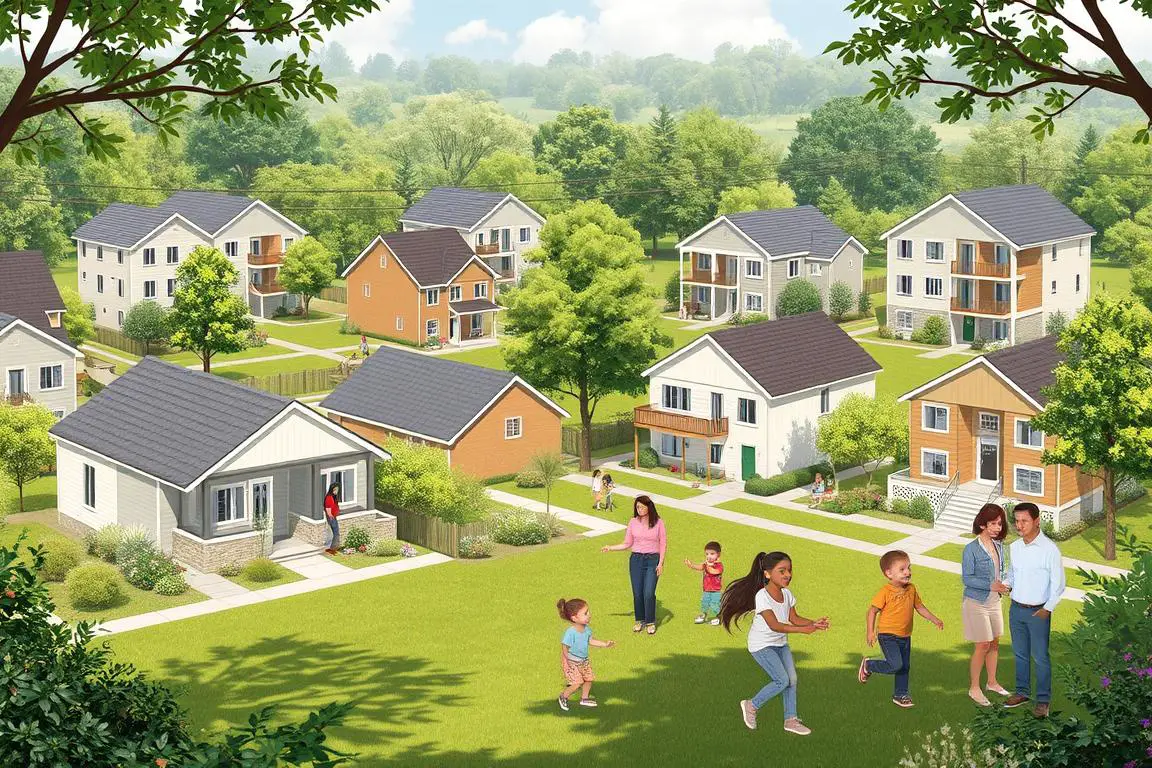Transform Your Living Situation: Must-Know Government Housing Assistance Options for You

Picture a place where the worry of losing your home is lifted by reliable support from the government. Government grants for housing assistance act as a crucial safety net. These help those struggling as living costs rise. The Housing Choice Voucher Program, by the U.S. Department of Housing and Urban Development (HUD), shines brightly for low-income folks, the elderly, and the disabled. It lets them live in homes with amenities they once could only hope for1.
Housing assistance does more than just help pay the bills. It brings respect by limiting rent and utility bills to 30% of a person’s monthly income. This ensures living costs stay manageable1. HUD works with local Public Housing Agencies to create these opportunities. This shows the belief that everyone deserves a stable home for a steady life.
If life has you struggling to make ends meet or facing sudden challenges, don’t lose hope. There’s usually help just an application away. Knowing the right programs can turn your living situation around, paving the way to a hopeful future.
Key Takeaways
- Explore essential government housing assistance programs tailored for low-income individuals and families.
- Understand the pivotal role of the Housing Choice Voucher Program in providing affordable housing solutions.
- Discover the criteria for eligibility and the process of obtaining low income housing grants.
- Learn the significance of the thorough checks and balances maintained by PHAs and HUD.
- Grasp the ability to maintain housing assistance while moving, thanks to flexible programs in place.
- Realize how housing aid can extend beyond mere vouchers, encompassing broader aspects of life stability.
Understanding the Housing Choice Voucher Program
Many people seek affordable housing through key programs. The Housing Choice Voucher Program is leading in helping individuals and families. It aims for their financial stability and to live in a safe, decent environment.
Eligibility and How to Apply
To get federal housing help, you need to meet certain rules. These include your income, your family size, and if you’re a citizen or allowed immigrant. Local Public Housing Agencies decide who gets help based on where you live. They have strict income limits set by HUD2>3. To apply, talk to your local PHA when they’re taking new applications2.
Virginia Housing works with local agencies to run the HCV program well2.
The Role of Public Housing Agencies (PHAs)
PHAs are key in giving out housing grants with federal money from HUD. They make sure homes are safe and healthy and check annually if families still qualify. They also step in if landlords don’t follow the rules of the housing assistance agreement.
Tenant, Landlord, and HUD Responsibilities
In this program, tenants, landlords, and HUD all have important roles. Tenants must keep their place nice, follow their lease, and tell the PHA about any big changes. Landlords must offer safe, affordable homes and stick to the lease terms. HUD pays for the program, helping PHAs provide a good experience, including help with house hunting and paying for utilities2.
Local Preferences, Waiting Lists, and the Process of Moving
PHAs use local preferences and waiting lists to manage who gets housing help first. They often help those homeless, paying too much for rent, or forced to move. This system keeps housing stable, even when families move to a new area or stay in their current place, as long as they follow the rules2. This flexibility helps maintain housing stability even when families choose to move, whether within their current PHA jurisdiction or to a new one, provided they comply with the necessary regulatory protocols.
Millions in the U.S. benefit from the Housing Choice Voucher Program. It stands out as a big chance for housing help3. Knowing how the Housing Choice Voucher Program works is key. It helps you make the most of this opportunity and other housing supports.
Emerging From Disaster: FEMA’s Role in Housing Recovery
After a disaster, FEMA offers hope to those affected. They help with renting, lodging, fixing homes, and rebuilding, paying special attention to community safety and making sure homes are accessible for everyone with disabilities.
Rental and Lodging Expense Assistance
Temporary housing costs can be overwhelming. FEMA helps by providing housing assistance to those pushed out of their homes by disasters. After hurricanes Helene and Milton, over 7,200 homes were ruined, and more than 1,200 people ended up in shelters4. FEMA responded swiftly, giving $750 per household to help with immediate housing needs4. This quick action shows FEMA’s dedication to helping people find a safe place to stay.
Home Repair and Reconstruction Funding
FEMA offers up to $42,500 for home repair and rebuilding, with extra money available for other disaster costs4. They work with agencies like HUD to promote safer rebuilding practices5. This teamwork supports affordable housing and encourages responsible home ownership and readiness for future challenges.
The Significance of Hazard Mitigation Assistance
FEMA invests in making homes that can stand up to future disasters. Working with HUD, they help states plan for strong housing recovery5. These efforts encourage people to protect their homes against future damage and follow new federal guidelines for reducing flood risks5.
Specialized Aid: Addressing Accessibility Needs and Other Serious Disaster-related Expenses
FEMA’s housing grants cater to many needs, including accessibility and big disaster expenses. They even offer group flood insurance to help guard against flood damage. This targeted support is about more than fixing things; it’s about building back stronger communities4.
FAQ
What are some government grants for housing available to assist me?
How do I determine if I’m eligible for housing assistance programs?
What is the Housing Choice Voucher Program and how do I apply for it?
What are Public Housing Agencies (PHAs) and what role do they play in housing assistance?
Can you explain the responsibilities of tenants, landlords, and HUD in the Housing Choice Voucher Program?
How do local preferences and waiting lists affect my chances of receiving housing assistance?
How does FEMA assist with housing recovery after disasters?
What are the key features of the Hazard Mitigation Assistance provided by FEMA?
Can I receive financial aid for my housing needs if I am a survivor with a disability?
Are there provisions for special non-housing needs under FEMA’s disaster assistance?
Source Links
- Housing Choice Voucher Program Section 8 – https://www.hud.gov/topics/housing_choice_voucher_program_section_8
- Housing Choice Voucher Program – Virginia Housing – https://www.virginiahousing.com/renters/housing-choice-voucher-program
- Federal programs for affordable housing – Local Housing Solutions – https://localhousingsolutions.org/fund/federal-programs-for-affordable-housing/
- Beyond bottled water and sandwiches: What FEMA is doing to get hurricane victims back into their homes | The Invading Sea – https://www.theinvadingsea.com/2024/11/03/federal-emergency-management-agency-fema-disaster-relief-insurance-hurricane-milton-helene/
- Disaster Housing Recovery Update – July 29, 2024 – https://nlihc.org/resource/disaster-housing-recovery-update-july-29-2024






